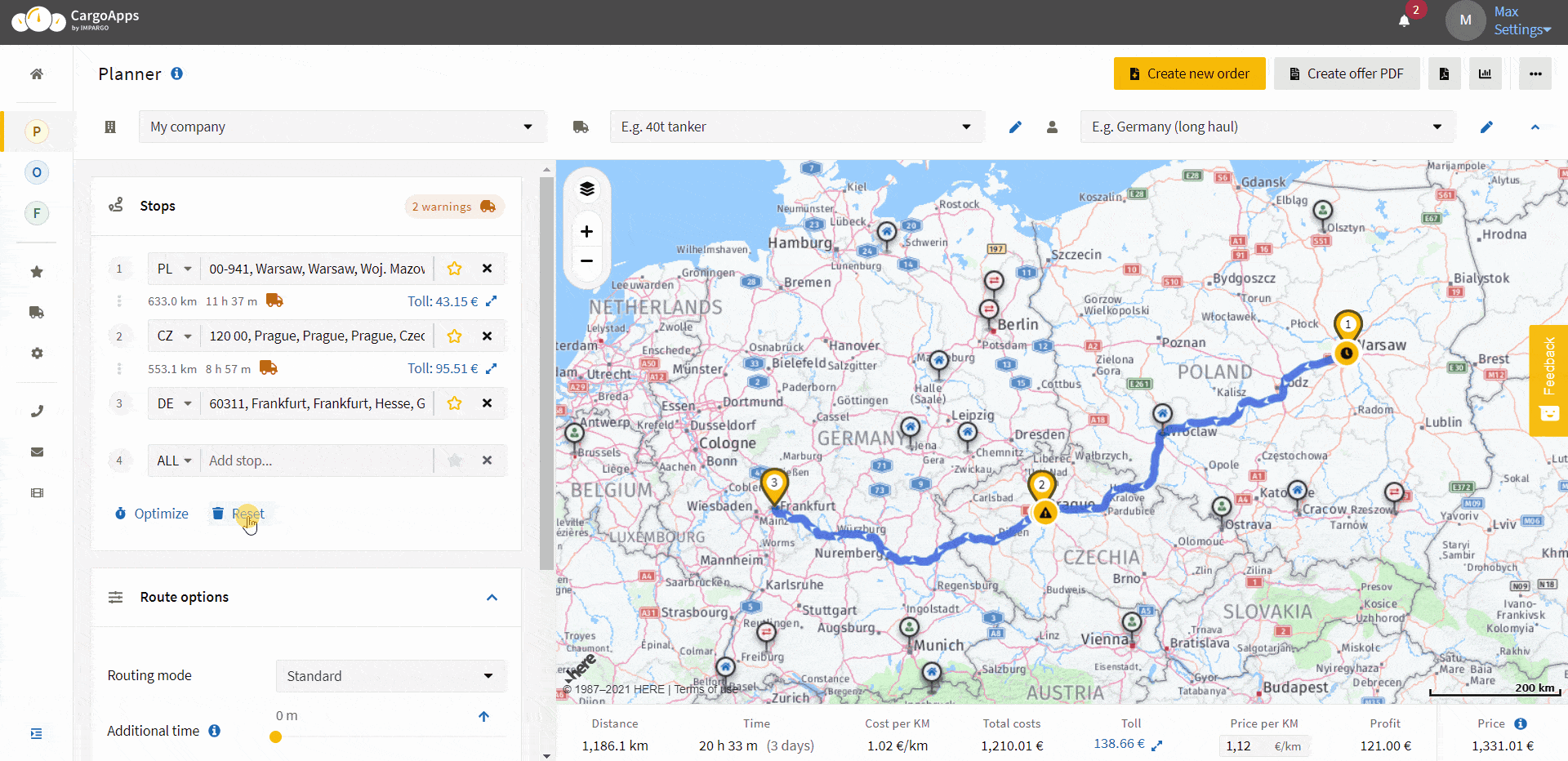After April 29, 2024, UK Heavy Goods Vehicles (HGVs) won't get paper MOT certificates anymore.
Instead, operators can access their pass certificates online through the MOT history service. They can still ask for a paper certificate during the test if they want, but it won't be automatic.
Paper certificates will only be given if the vehicle fails the test. This change helps save paper and gives easy access to up-to-date test records.
How to manage HGVs / LGVs in the UK Online?
IMPARGO TMP® is a Transportation Management Platform designed for digital truck dispatching. It allows easy collaboration with all stakeholders in the transport, making transportation management easier than ever.
1. Online Truck Route Planning
Truck satellite navigation in Great Britain and all of Europe with automatic toll detection and round tour optimization.
2. Comprehensive Transportation Management
Full transportation management system with order and fleet management features. Calculate truck costs, including maintenance, fuel, driver wages, and additional overhead expenses.
3. Live Communication
Communicate with drivers, send precise routes, and avoid traffic and country-specific restrictions.
4. Easy Truck Load Planning
Organize load details, considering truck and trailer types, and monitor the entire transport process with clarity.
5. Send GPS Tracking Links for Transports
To keep your customers informed, you can send them an order confirmation along with a tracking link.
6. Transportation Offer Creation
Effectively handle, send, and manage transport proposals using the IMPARGO platform. This simplified procedure improves communication with clients and facilitates a smooth transition from proposal to order.

HGV / LGV MOT Certification in the UK (Annual Test)
What is the MOT (annual test) certificate?
The MOT certificate confirms that your vehicle at the time of its test met the minimum acceptable environmental and road safety standards needed by law.
The MOT certification in the UK is required for Heavy Goods Vehicles (HGVs) and Large Goods Vehicles (LGVs) falling under the following categories:
- Goods vehicles with a gross weight exceeding 3,500 kilograms (kg).
- Vehicles designed or modified to be part of an articulated vehicle.
- Semi-trailers.
- 'A' frame trailers and converter dollies made on or after January 1, 1979.
- Trailers with an empty weight over 1,020 kg equipped with powered braking systems (in addition to standard overrun brakes and the necessary parking brake).
Vehicle test and certificate costs: HGVs and trailers
This guide lists lorries and trailers specific costs test fees and average test lengths for:
- MOT (annual tests) fees
- Retests fees
- Prohibition clearances fees
- Dangerous goods (ADR) fees
- TIR test fees for quicker border crossings
- Low emissions certificate fees
- Certificate of keeper fees
- Voluntary checks fees
- Voluntary roadworthiness test fees
Vehicles that are exempt from the HGV MOT
If you have a goods vehicle weighing over 3,500kg (or any vehicle falling under type approval categories N2, N3, O3, O4, or T), you must complete this form and present it when you tax your vehicle at a Post Office®.
This form can also be used for goods vehicles in Northern Ireland weighing 3,500kg or less (or any other Northern Ireland goods vehicle in category N1).
If your vehicle doesn't require an MoT test, please fill out a V112 form.
List of Vehicles that are exempt from the HGV MOT
- Dual-purpose vehicles not made for articulated vehicle use.
- Road rollers.
- Mobile machinery not for carrying passengers or goods.
- Vehicles used only for firefighting or fire salvage.
- Works trucks and trailers.
- Goods vehicles powered by electricity registered before March 1, 2015 (in GB).
- Vehicles for snow clearing or spreading materials on roads.
- Lifeboat haulage vehicles.
- Vehicles primarily for medical, educational, or clerical purposes.
- Motor vehicles used within limited distances on public roads.
- Category T tractors meeting specific criteria.
- Agricultural vehicles and trailers.
- Converter dollies for agriculture or forestry.
- Public service vehicles, licensed taxis, and funeral vehicles.
- Vehicles exempt by certain construction and use regulations.
- Test or trial vehicles for manufacturers or importers.
- Vehicles with specific international registration marks.
- Vehicles exclusively used on certain islands.
- Trailers with international bases.
- Track-laying vehicles.
- Industrial tractors (NI).
- Steam-propelled vehicles.
- Vintage vehicles and trailers used within set conditions.
- Vehicles for street cleaning or refuse collection under certain specifications.
- Vehicles used for aircraft servicing on aerodromes.
- Vehicles used for police purposes.
- Play buses.
- Living vans under a certain weight limit.
- Showman’s vehicles operating in the UK.
- Vehicles with a maximum speed below 15.5 miles per hour.
- Vehicles authorized by Special Types General Orders or Vehicle Special Orders.
When is the MOT annual test due?
MOT due dates for HGVs / LGVs typically require testing every year. The initial test is due 12 months after the vehicle's registration with the Driver and Vehicle Licensing Agency (DVLA).
For trailers, the usual testing schedule is one year after their first sale or supply.
How to get an annual test (MOT) for HGVs or trailers?
- Step 1: Check when your annual test is due by visiting this link: Check MOT History.
- Step 2: Sign up for email or text reminders about your test: Get MOT Reminders.
- Step3: Find your nearest test center and book your test online: Book Vehicle Annual Test.
- Step 4: Fill out an application form before booking your test if it's the first time the vehicle is being tested. Use the appropriate form for heavy goods vehicles or trailers manufactured before October 29, 2012:
- a. Heavy Goods Vehicle Application Form: HGV Application Form.
- b. Trailer Application Form (pre-October 2012): Trailer Application Form.
- Step 5: Prepare for the test by:
- a. Checking your vehicle's headlamp aim.
- b. Checking brakes for heavy goods vehicles.
- c. Reviewing procedures for carrying dangerous goods.
- d. Getting your vehicle checked by a qualified mechanic using the heavy goods vehicle inspection manual: HGV Inspection Manual.
- Step 6: Gather the necessary documents required for the test, especially if your vehicle carries dangerous goods or is exempt from certain regulations:
- a. Check Required Documents: At the Test Centre.
- b. Additional Documents:
- Tachograph Exemption Declaration Form: HGV Tachograph Exemption.
- Speed Limiter Exemption Declaration Form: HGV Speed Limiter Exemption.
- Certificate for Carriage of Dangerous Goods: HGV Dangerous Goods Certificate.
- Step 7: Take your HGV to the test center and await the results. You'll be informed if your vehicle passes or fails the test.
FAQ
What is the MOT certificate?
The MOT certificate confirms whether your vehicle meets the minimum acceptable environmental and road safety standards required by law at the time of the test.
What does MOT stand for?
MOT stands for Ministry of Transport Test. Although the Ministry of Transport itself no longer exists, the term MOT has stuck around as the name of this important annual inspection.
How much does an MOT cost?
The official fees guide lists lorries and trailers specific costs test fees and average test lengths for:
- MOT (annual tests) fees
- Retests fees
- Prohibition clearances fees
- Dangerous goods (ADR) fees
- TIR test fees for quicker border crossings
- Low emissions certificate fees
- Certificate of keeper fees
- Voluntary checks fees
- Voluntary roadworthiness test fees
When will digital MOT certificates be introduced?
Starting April 29, 2024, paper MOT certificates for HGVs will be discontinued in the UK. Operators will be able to access their certificates online through the MOT history service. Paper certificates can still be requested during the test but won't be given automatically unless the vehicle fails.
What are the benefits of Digital MOT Certificates?
- Saves paper
- Provides easy access to up-to-date test records
How to Manage HGVs / LGVs Online?
IMPARGO TMP® is a Transportation Management Platform that simplifies truck dispatching and transportation management in the UK and Europe. It offers features like:
- Easy truck route planning
- Comprehensive transportation management
- Market price forecasting
- Real-time communication with drivers
- Smart truck load planning
- Tracking links for customers
- Sending and managing transport proposals
When is the MOT test due?
MOT tests are typically required annually for HGVs or LGVs. The initial test is due 12 months after registering the vehicle with the DVLA. Trailers usually require testing one year after their first sale or supply.
How to check MOT history?
You will need a vehicle's number plate (registration number) to see when your vehicle’s MOT will expire. Click here to access the official MOT history check.
What is the expiration date of the MOT?
To determine its expiration date, you can either:
- review your MOT history on the internet
- refer to the expiration date indicated on your current MOT certificate, if you possess one

